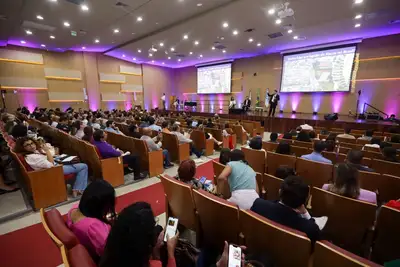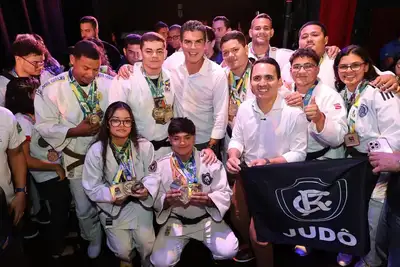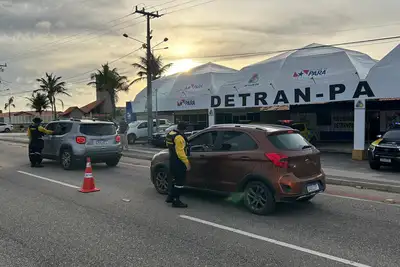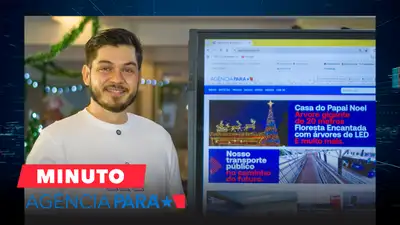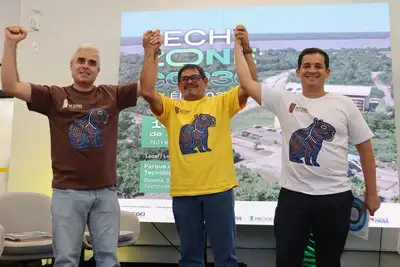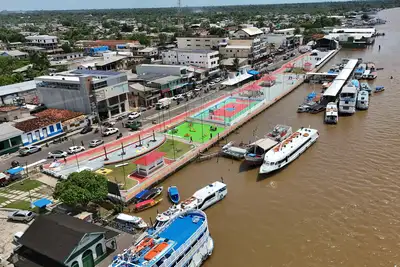Ideflor-Bio receives Argentine delegation and strengthens cooperation in environmental conservation
The group participated in dialogue, experience exchange, and identification of common points between Amazonian challenges and those faced by Argentine provinces
A delegation formed by 12 representatives from provinces (states) of Argentina visited the Forest Development and Biodiversity Institute of Pará (Ideflor-Bio) in Belém this Friday (14). The members of the delegation were interested in learning about the conservation actions developed by the State of Pará, especially in conservation units.
The visit was led by the president of the Institute, Nilson Pinto, accompanied by Technical Advisor Thiago Valente and the advisor to the Presidency, Juan Hoyos. The meeting marked another chapter in the expansion of the international relations of the agency, which has been standing out for its policies on forest restoration, sustainable management, and biodiversity conservation.

The Argentine delegation included representatives from the provinces of Buenos Aires, La Pampa, Córdoba, Santa Fé, Colcas, Entre Ríos, and Jujuy — a group organized under the name Alianza Verde Argentina. Among them were authorities such as Enrique Estévez, Minister of Environment and Climate Change of Santa Fe; Diego Martín, Secretary of Climate Change; and Claudio Díaz, Secretary of International Relations, as well as directors, technicians, and managers from the areas of environment, climate, and governmental innovation. The diverse profile of the delegation reinforces the interest of provincial governments in integrated territorial management models.

Knowledge exchange - For about two hours, the group participated in a dialogue considered "fruitful and extremely rich" by Ideflor-Bio, with the exchange of experiences and identification of common points between Amazonian challenges and those faced by Argentine provinces. Topics such as ecological restoration, governance of conservation units, wildlife protection, community management, and international financing for environmental actions were discussed. The discussion also highlighted the importance of models that reconcile economic development, water security, and mitigation of climate impacts.
The meeting resulted in concrete proposals to deepen international cooperation. The delegation and Ideflor-Bio aligned strategies to formalize a technical exchange agenda, including future technical visits to Pará and Argentina, joint participation in regional events, and the creation of thematic working groups. The rapprochement may also favor binational projects aimed at ecological connectivity, climate risk management, and the enhancement of community initiatives in protected territories.
Amazônia immersion - As a final step of the agenda, the delegation was taken on a guided technical visit to the Utinga Camillo Vianna State Park, one of the main urban conservation units in Brazil. At the site, the Argentine representatives were able to closely observe the monitoring work, protection of water sources, environmental education, and biodiversity management carried out by Ideflor-Bio. The experience allowed them to see practices that inspire policies applicable to Argentine provinces, especially on issues involving the relationship between protected areas and urban centers.
Throughout the tour in Utinga, the visitors expressed interest in understanding how Pará integrates environmental protection and public use in its conservation units. The dialogue with managers and technicians reinforced the importance of initiatives that promote social well-being, sustainable leisure, and community engagement in environmental defense. According to the participants, the visit allowed them to concretely visualize management models that strengthen climate resilience and biodiversity conservation on a territorial scale.
Diversity - Composed of state secretaries, climate directors, innovation technicians, and those responsible for international relations, the delegation highlighted the strategic nature of the meeting. Representatives such as Maximiliano Gómez (Entre Ríos), Rosa Hoffman (Entre Ríos), Vanina Basso (La Pampa), Florencia Ricard (La Pampa), Rosario María Boggioni (Jujuy), and Augusto Carreras (Córdoba) were present. According to the group, the visit to Pará broadened perspectives on multiscale environmental governance and the role of conservation units in promoting climate security.

Lasting partnerships - For Nilson Pinto, the meeting strengthens Pará's positioning as a reference in the conservation agenda in South America, especially at a time when international cooperation becomes essential to face global climate challenges. For the manager, in addition to presenting consolidated initiatives, the Institute reinforced its willingness to build lasting and collaborative partnerships with foreign governments, expanding technical-scientific exchange and opportunities for environmental innovation.
“Receiving the Argentine delegation was a valuable opportunity to strengthen ties and share the knowledge that Pará has been accumulating in the management of its conservation units. We have common challenges and enormous possibilities for cooperation. By opening our doors, we reaffirm our commitment to work in an integrated manner with our Latin American neighbors to protect biodiversity, restore ecosystems, and promote sustainable development with social participation,” emphasized Nilson Pinto.








